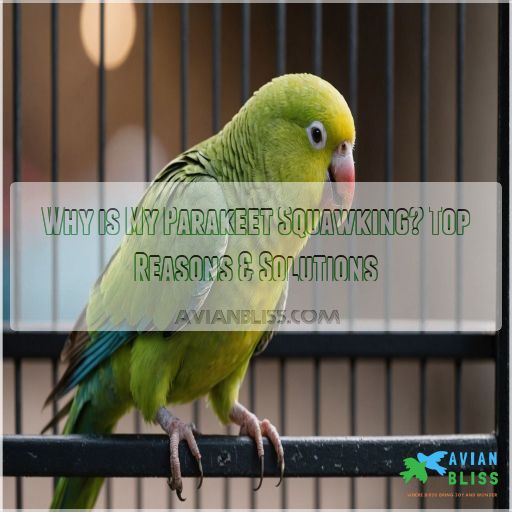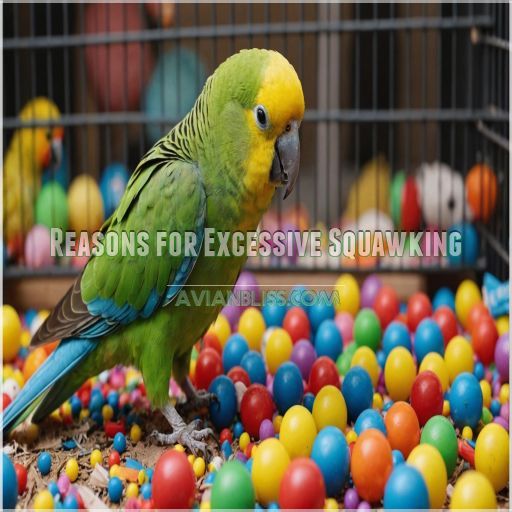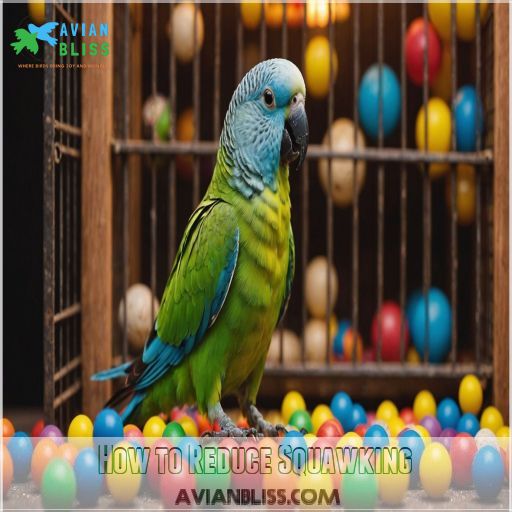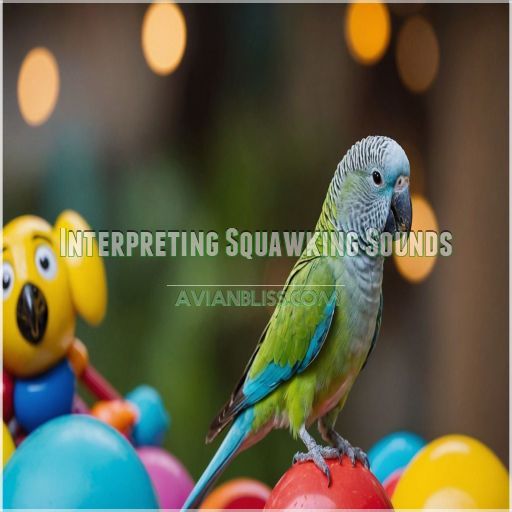This site is supported by our readers. We may earn a commission, at no cost to you, if you purchase through links.
 Wondering why your parakeet’s squawking up a storm? It might be trying to tell you a thing or two! Often, it’s sheer boredom or a plea for some hang-out time. Imagine being stuck with the same old sitcom reruns all day—your feathered friend might feel the same.
Wondering why your parakeet’s squawking up a storm? It might be trying to tell you a thing or two! Often, it’s sheer boredom or a plea for some hang-out time. Imagine being stuck with the same old sitcom reruns all day—your feathered friend might feel the same.
But squawking could also signal stress, medical issues, or be just its natural chatty self. Paying attention to body language—like puffed feathers or excited dancing—can offer clues. You’ll soon become the Sherlock Holmes of bird behavior!
Ready to transform that noise into sweet chirps? Stick around for some clever solutions!
Table Of Contents
- Key Takeaways
- Why is My Parakeet Squawking?
- Reasons for Excessive Squawking
- How to Reduce Squawking
- Interpreting Squawking Sounds
- Solutions for a Quieter Parakeet
- Frequently Asked Questions (FAQs)
- Why does my parakeet Squawk?
- Why do parrots Squawk?
- Why does my bird Squawk?
- Do parakeets Squawk?
- Why are my parakeets squawking so much?
- How do I get my budgie to stop squawking?
- What does it mean when your parakeet screeches?
- Why does my parakeet randomly scream?
- Can parakeets squawk due to health issues?
- Does parakeet squawking indicate a need for attention?
- Is hormonal behavior a cause for squawking?
- Can environmental changes affect parakeet squawking?
- Do certain noises or interruptions trigger squawking?
- Conclusion
Key Takeaways
- Don’t worry if your parakeet’s squawking ricochets off the walls—it’s their form of lively conversation! They might just be hollering for attention or expressing sheer boredom, so adding more toys or a feathered buddy could be the ticket to calm.
- Your parakeet might be taking cues from a rock band—squawking excessively when stressed or anxious. Keep an eye out for changes in their environment or anything that might rattle their little nerves and aim to create a serene sanctuary.
- Consider it a birdie SOS if your parakeet’s noise levels hit an all-time high. Medical issues like feather plucking or unusual screeching warrant a swift vet visit. Catching these signals early means you’re the Sherlock Holmes of parakeet care!
- Embrace the art of bird whispering by understanding their squawk language. Whether they’re signaling danger or just feeling chatty, being the detective in their vocal and body language mystery will strengthen your feathered friendship.
Why is My Parakeet Squawking?

If your parakeet won’t stop squawking, there might be more behind it than just a love for noise.
Whether it’s boredom, stress, or even their way of saying, "Hey, give me some attention," understanding these feathered moods is key to keeping both you and your bird happy.
Boredom and Loneliness
Boredom and loneliness can drive your parakeet to squawk excessively.
Parakeets are highly social and require ample mental stimulation to thrive.
Make sure your feathered friend has:
- Plenty of toys and activities to keep them engaged
- Opportunities for out-of-cage playtime and exploration
- A suitably sized cage with diverse perches
- Interaction and bonding time with you each day
- A potential companion bird for companionship
Stress and Anxiety
Sometimes, your parakeet’s squawking is a cry for help, like a singer who’s lost their rhythm. Stress triggers like sudden changes or lack of enrichment can lead to parakeet anxiety .
Watch for anxiety signs such as shifts in vocalization or aggression.
Creating a calm environment helps reduce stress, offering both you and your feathered pal peace of mind.
Attention Seeking
Your parakeet’s squawking could be an attention-seeking trick.
Imagine a child yelling, "Look at me!"
- Ignore the squawks, but offer love when silent.
- Use positive reinforcement; reward quietness.
- Rotate toys for fun distractions.
- Spend quality time interacting.
These parakeet training tips will nurture a peaceful companion .
Medical Issues
When your parakeet’s squawking seems more like a scream for help, it might be waving a red flag about its health.
Sudden changes in chirping could point to parakeet illness—like feather plucking or excessive screeching.
A swift vet visit is a sound decision, as common diseases can turn serious.
Keep an eagle eye on your feathered friend’s behavior!
Natural Vocalizations
Parakeets, the chatterboxes of the bird world, often squawk due to natural vocalizations that are simply part of their avian language.
Like enthusiastic toddlers, these feathered friends use chirping patterns to connect with their flock.
Species differences and age variation add color to this communication tapestry.
Embrace the symphony of bird body language and vocalization types—it’s parakeet meaning in action!
Reasons for Excessive Squawking
Is your parakeet squawking more than usual, turning your home into an unexpected concert hall?
Just like us, these little feathered friends need enough stimulation, a stable environment, and regular health check-ups to keep their vocalizations in check.
Lack of Enrichment
Excessive parakeet squawking might signal there’s a lack of enrichment in their lives.
Imagine this: a parakeet in a dull cage gets twitchy and chatty.
Providing toys like chewables, foraging activities, and a varied cage setup can be the ticket to parakeet noise reduction.
Remember, adding playtime makes sure they’re busy, entertained, and happy .
Insufficient Social Interaction
Your parakeet may squawk excessively due to a lack of social interaction.
Parakeets are highly social creatures, and without the companionship of their flock, they can become lonely and distressed.
Consider getting your feathered friend a same-species companion or dedicating more quality time to playtime and training.
Positive reinforcement and engaging activities can go a long way in reducing their squawking.
Changes in Environment
When you’re relaxing on the couch and suddenly wonder, "Why is my parakeet squawking?" consider recent changes.
A new cage spot, increased noise levels, or introducing unfamiliar toys can ruffle their feathers.
Parakeets aren’t fond of sudden upheaval—moving home or travel stress makes them feel like they’re on a roller coaster without a safety bar (Source).
Medical Conditions
While moving might ruffle their feathers, medical conditions can really make parakeets squawk up a storm.
Watch out for illness signs like:
- Psittacosis Treatment: Known as "parrot fever," it requires speedy avian vet checkups.
- Avian Gastric Yeast: This infection can upset their little tummies.
- Feather Plucking: Often a scream for help rather than fashion advice.
Keep their health in check .
Behavioral Issues
Parakeet behavioral quirks, like squawking, often mask deeper issues like boredom or stress.
When your bird channels its inner rock star, it might be craving attention, feeling crowded, or dealing with parakeet aggression.
To tame the tantrums, think about exploring larger cages, clever training tips, or a toy bonanza.
Remember, addressing feather plucking or biting behavior requires patience, persistence, and a sense of humor .
How to Reduce Squawking
If your parakeet’s squawking is driving you nuts, it’s time to explore some solutions to help hush the feathery noise machine.
By focusing on enrichment activities and spending quality time, you’ll calm the chaos but also strengthen your bond with your beloved birdie.
You can also ensure a peaceful environment for your parakeet.
Providing Enrichment
To reduce squawking, kick boredom to the curb with parakeet toys and DIY enrichment.
Incorporate foraging fun by hiding snacks among paper rolls or ladders.
Craft a cage design that screams adventure with nooks to explore.
Give your parakeet a mental workout—it’s like CrossFit, but for birds!
Watch them thrive and chirp happily .
Spending Quality Time
Want to reduce squawking? Spend quality time with your feathery friend! Your parakeet craves interaction, and bonding can be fun with these playtime ideas:
- Play Tunes: Sing or whistle, making cage time enjoyable.
- Training Tips: Teach a new trick with gentle guidance.
- Interaction Tips: Share treats while chatting softly.
Build trust and watch your parakeet thrive!
Creating a Calm Environment
Crafting a tranquil environment for your parakeet is key.
Opt for a suitably sized cage and fill it with quiet, calming toys.
Minimize disruptive noises and create a safe, consistent routine .
Your feathered friend will feel secure, allowing you to bond and enjoy their cheerful company.
A little effort goes a long way in keeping your parakeet calm and content.
Addressing Medical Issues
Spotting signs of illness in your parakeet can feel like finding a needle in a haystack.
Notice any changes in behavior, such as excessive squawking?
It might be time for a vet visit.
Common health issues like mites, nutritional deficiencies, or infections could be the culprit.
Don’t play doctor! Trust a pro for accurate diagnosis and treatment options .
Considering a Companion
Adding a feathered friend might just quiet your parakeet’s chatter.
Introducing a new companion involves careful selection to make sure compatibility and social harmony.
Begin with a quarantine period in a separate room, then gradually work up to supervised interactions in neutral spaces.
Make sure the cage is spacious, with duplicate amenities to prevent squabbles.
Remember, double trouble can become delightful dynamics!
Interpreting Squawking Sounds
Understanding why your parakeet squawks can feel like unraveling a mystery, but it’s all about reading the signs.
From deciphering different squawks to watching their fluttering and strutting, knowing their communication styles helps you tell whether they’re feeling chatty or a bit cranky.
Different Types of Squawking
After learning how to reduce squawking, it’s time to understand the different squawk types.
Parakeet squawk language can range from a chirrup signaling boredom or attention-seeking, to alarmed squawks indicating fear or threats .
Recognize these sounds to provide better care, ensuring your feathered friend’s comfort isn’t just “for the birds”!
Body Language and Behavior
After considering different squawking types, observe your parakeet’s body language.
Those little quirks—like beak grinding—tell you a lot!
If your feathery friend struts about with puffed feathers and bright eyes, he’s likely saying, "I’m content!"
Yet, a sudden head bob might mean, "I’m stressed!"
By understanding these body language cues, you’ll keep your parakeet chirpy and stress-free .
Combination of Sounds and Visual Cues
Imagine parakeet communication as a lively dance of sound and nonverbal cues.
When your bird squawks, watch for body language like fluffed feathers or pinpoint pupils.
Is it a happy dance or a distress signal?
By interpreting vocalization meaning with these visual hints, you’ll figure out the secret code of your feathered friend’s mind, ensuring harmony in your aviary oasis .
Contextualizing Squawking Behaviors
To fully understand your parakeet’s squawking, consider the context. Is the squawking accompanied by certain behaviors, like fluffed feathers or a tense posture? These visual cues can help you determine if the squawking signals distress, excitement, or simply your bird’s natural way of communicating.
Pay attention to the tone, volume, and frequency to decipher the meaning behind the squawks.
Communication Styles of Parakeets
Understanding your parakeet’s communication styles can feel like speaking bird! Squawking sounds are more than noise; they’re your parakeet’s way of chatting.
- Chirping Meanings: Happy chats or warning signals.
- Behaviors and Body Language: Wing flapping or ruffled feathers signal emotions.
- Communication Tips: Pay attention to these cues to build a safer, controlled environment for both of you .
Solutions for a Quieter Parakeet
To help your parakeet squawk less, try making their environment more stimulating and fun.
With a little training and the right toys, you’ll be the proud owner of a quieter, happier bird.
Environmental Changes
Squawking can be curbed by tweaking the surroundings. Consider cage size and location changes for comfort .
Keep noise levels stable and consistent to avoid startling your parakeet .
Introduce new toys strategically to capture their curiosity without overwhelming them. Routine changes, when needed, should be gradual to reduce stress and create a tranquil environment, giving your feathered friend a peaceful retreat .
Toy Rotation and Enrichment
While sprucing up a parakeet’s habitat, it’s easy to forget the importance of play.
Rotate toys like a carousel to stave off boredom and squawking.
- Foraging Toys: Hide treats to mimic hunting.
- DIY Toys: Safe, homemade options save money.
- Climbing Structures: Encourage exercise.
- Toy Safety Checks: Regularly inspect for wear.
Boredom doesn’t stand a chance!
Training and Socialization
Training your parakeet, you’ll build a strong bond and reduce squawking.
Use socialization techniques like playing games or teaching simple tricks.
Praise and reward for desired behaviors; it’s like discovering a hidden treasure chest.
With consistency, parakeet behavior improves, turning squawks into delightful chirps, making your feathered friend a harmonious addition to your home .
Managing Noise Levels
Taming the noise of your parakeet starts with strategic soundproofing and thoughtful cage location.
Consider using quiet toys to keep them entertained without the jazz band effect .
Training can also help; think of it like teaching a toddler indoor voice rules.
Remember, it’s all about finding harmony between their natural chatter and your peace.
Seeking Professional Help
If you’ve tried everything and your parakeet’s squawking persists, it may be time to consult a professional. A qualified avian veterinarian or certified parakeet behaviorist can provide personalized guidance to address the root cause, whether it’s a medical issue, environmental factor, or behavioral problem. They can also recommend training techniques to curb excessive vocalizations and help you and your feathered friend live in harmony.
- Veterinarian visits to rule out health concerns
- Consultations with certified parakeet behaviorists
- Joining online forums to connect with bird experts
Frequently Asked Questions (FAQs)
Why does my parakeet Squawk?
Picture your parakeet as a tiny town crier.
Squawking signals concerns—perhaps hunger, a draft, or a curious cat prowling nearby.
It’s their way of grabbing your attention, ensuring their tiny world is safe and sound .
Why do parrots Squawk?
Parrots squawk to communicate, seek attention, or express emotions like excitement or distress.
They’re letting their "flock" know they’re around, sometimes just seeking a bit of companionship .
Just like us hollering across the house, parrots are making their presence known.
Why does my bird Squawk?
Your bird squawks to communicate various messages, like warning of danger, claiming territory, or seeking your attention.
It’s like a feathery radio station broadcasting important bird news.
Respond to it to help manage the noise .
Do parakeets Squawk?
Yes, parakeets squawk.
It’s their way of expressing excitement, alerting you to problems, or making contact calls.
When things get loud, they’re signaling something’s up in their world that needs your attention .
Why are my parakeets squawking so much?
Sounds like your feathered friend is sounding the alarm, chirping up a storm to let you know something’s amiss.
Check the cage setup and make sure all their needs are met – food, water, and a cozy home.
How do I get my budgie to stop squawking?
Try a gentle whisper; birds often quiet down to listen.
Make sure they get enough sleep, entertain them with a radio or TV, and check their nutrition.
Consistency is key, but remember, personality varies and patience is essential (Source).
What does it mean when your parakeet screeches?
When your parakeet screeches, it’s like an alarm bell ringing—it signals distress or discomfort.
They might be alerting you to a predator, seeking food, or reacting to a change in their environment .
Why does my parakeet randomly scream?
Your parakeet might scream for attention, instinctively communicating like it would in the wild with its flock.
It can also signal needs, such as hunger, fear, or boredom, or respond to its environment’s noise .
Can parakeets squawk due to health issues?
Parakeets might squawk due to health issues like respiratory infections, nutritional problems, or stress.
It’s really important to consult a vet, as birds often mask illness symptoms, making early detection and treatment essential .
Does parakeet squawking indicate a need for attention?
Yes, squawking can mean your parakeet’s craving attention.
It’s their way of saying, "Hey, don’t forget me!"
Ignoring them might spark louder squawks, similar to an "extinction burst" in behavior science .
Is hormonal behavior a cause for squawking?
Hormonal shifts can stir up quite a racket in your feathered friend.
They may squawk louder and more frequently due to changes in light, temperature, or interactions often driven by natural instincts (Source).
Can environmental changes affect parakeet squawking?
Your feathered friend’s squawking could stem from environmental changes, like a new home or noisy surroundings. Try creating a cozy, secure space to help them feel at ease.
Do certain noises or interruptions trigger squawking?
Loud noises or environmental changes often trigger your parakeet’s squawking.
They might be reacting to something new, perhaps a pet or unexpected sound, similar to how we might shout at surprise fireworks .
Conclusion
So, your parakeet’s squawking is like its way of sending you a feathered SOS.
Whether it’s due to boredom, seeking attention, or just its natural vocal tendencies, understanding these cues helps keep your bond strong.
A bit of detective work on your part with body language and vocal clues will work wonders.
With our tips, your home can transform from squawk central to a symphony of sweet chirps.
Embrace your inner bird whisperer and let the good times chirp!







